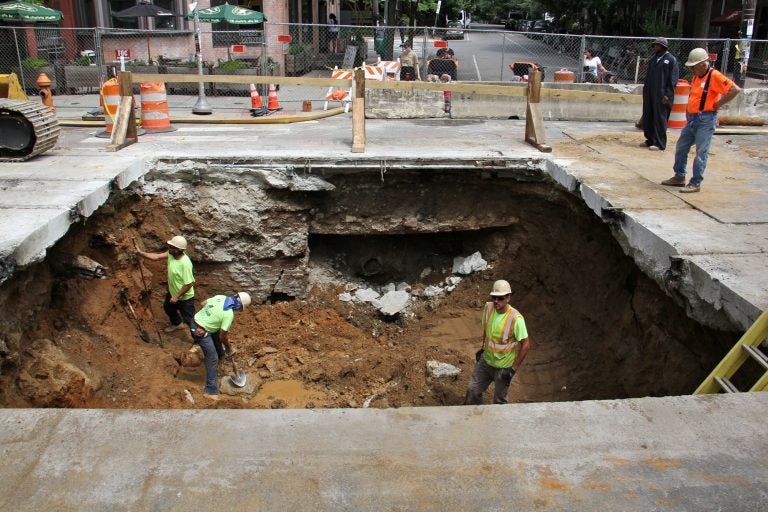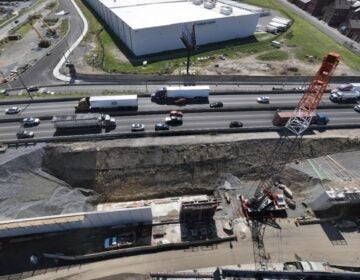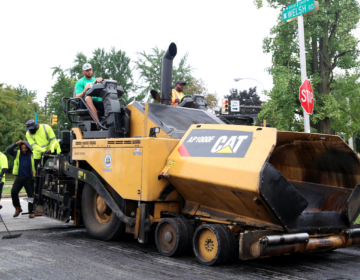Massive sinkhole will disrupt Baltimore Ave. traffic another 3 weeks
City workers repairing a 400-square-foot cavern just below the asphalt on Baltimore Avenue at 43rd Street will need three more weeks to get the job done.

A sinkhole in Baltimore Avenue at 43rd Street was caused by a faulty sewer pipe. (Emma Lee/WHYY)
This story originally appeared on PlanPhilly.
—
That is not a swimming pool under construction in the middle of Baltimore Avenue in Philadelphia.
One week after city workers discovered a 400-square-foot cavern just below the asphalt on Baltimore at 43rd Street, contractors remain on site repairing the massive sinkhole caused by a sewer line break.
A SEPTA shuttle bus will replace the route 34 SEPTA trolley that runs on Baltimore Avenue until the repairs are done and the street can be reopened.
The Philadelphia Water Department says the repairs will take another two to three weeks.
“We’ll certainly do our best to finish within the timeframe,” said Water Department spokesperson John DiGiulio.
Heather Redfern, a SEPTA spokeswoman, said the shuttle should not add any time to commutes. Rerouting the trolley would have added 10 minutes to rides, so the bus is a better solution, she said. An estimated 12,562 people ride the 34 daily.
The disruption isn’t the only SEPTA service change in West Philly these days. Routes 11, 36, and 10 are also experiencing disruptions and diversion, according to Philadelphia Magazine.
On Friday, awe-struck toddlers peered through a construction fence at Water Department contractors standing below the street digging in the exposed earth.

Workers found the sinkhole while responding to complaints about a basketball-sized indentation. The small depression was the sign of massive sinkhole below.
These subterranean hollows — known to swallow cars and people — are generally caused by the same kind of sewer break that caused the Baltimore Avenue bust.
The city says there were 1,560 sinkholes in 2017 and 1,675 in 2018. So far, there have been 510 in 2019.
“We don’t see this as a crisis,” former Water Commissioner Debra McCarty told PlanPhilly last July. The department, she noted, has shown the success of “thoughtful, judicious water-main replacements targeted to where the most need is — not just because it’s been 100 years or because someone has political pull. Because we have been doing this for years, we aren’t faced with a system that’s going to fall apart.”
McCarty’s successor, Randy Hayman, appointed in May, will take over the department on June 24.
DiGiulio says if residents see a dip in the pavement, they should contact the Water Department immediately.
“We’d be more than happy to come out and inspect to see what’s causing that depression,” he said.
WHYY is your source for fact-based, in-depth journalism and information. As a nonprofit organization, we rely on financial support from readers like you. Please give today.







